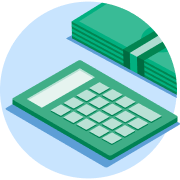How Much for a Down Payment on a House?




If you’re getting a mortgage for a home worth up to $500,000, the minimum down payment is 5%. Homes worth more need larger down payments.
The exact amount you’ll need for a down payment depends on three factors: Canada’s mortgage guidelines, the price of the home you’re buying and the requirements of your mortgage lender. That third factor might remain a mystery until later in your real estate search, but you can still get a good idea of how much down payment you’ll need by doing some simple calculations.
Down payment minimums
When you get a mortgage, the down payment is the amount you’re required to pay upfront. It represents a portion of the price of the house you hope to buy.
Canada’s lending rules have specific guidelines around minimum down payment sizes:
For homes under $500,000 the minimum down payment is 5%.
For homes between $500,000 and $1,499,999 you need 5% for the first $500,000 of the purchase price and 10% for the amount above $500,000.
For homes costing $1.5 million or more the minimum down payment is 20%.
There are cases where a lender may require a bigger down payment in order to approve you for a mortgage. People who are self-employed or have a poor credit history, for example, often need to put down more than the minimum. And if the monthly mortgage payments on a particular home are too big for a homebuyer’s budget, a larger down payment may be required to reduce the size of the mortgage — and the size of those payments — to a more manageable level.
If your down payment is less than 20%, you’ll have to purchase mortgage default insurance, which protects your lender in the event you can no longer pay your mortgage.
Ways to save for a down payment
If a 5%, 10% or 20% down payment feels like an awfully big number, you’re not wrong. The best way to save up a down payment is to start early.
Prioritize and budget
Look into your budget and see where if there are places to reduce costs and save money. While lowering your day-to-day expenses will help, prepare to make even greater sacrifices in pursuit of your goal. This might mean cutting out vacations, holding off on upgrading your devices, or driving a cheaper vehicle until you’re a homeowner.
Reduce your debt
It’s hard to save if you’re making monthly payments to creditors, so consider paying off your debts. An added benefit is that reducing debt will improve your debt service ratios, making it much easier for you to qualify for a mortgage.
Start a down payment savings account
Set up a savings account for your down payment. If possible, automate it and transfer money to the account every time you get paid.
A tax-free savings account (TFSA) or high-interest savings account (HISA) are accounts every prospective home buyer should consider. With a TFSA, you can invest the money you save in the account and not pay any tax on the earnings. And with a HISA, you’ll have easy access to your money while earning more interest than a basic savings account.
Borrow from your RRSP
Dipping into your retirement savings for a down payment is an option you should approach with caution, but it can be a way to become a home owner on a faster timeline. If you have a registered retirement savings plan (RRSP) you can borrow up to $35,000 from it, tax-free, for your first home as part of the Home Buyers’ Plan. That $35,000 could make up a significant chunk of your down payment.
Use NerdWallet's affordability calculator
See how a down payment affects how much house you can afford
Frequently asked questions
Can I get a mortgage with no down payment in Canada?
Can I get a mortgage with no down payment in Canada?
No. Canada has specific rules around minimum down payments that have been in place since 2008. You’ll have to put at least 5% down to get a mortgage for a home priced less than $500,000. More expensive homes require even larger down payments.
Is a down payment the same as a deposit?
Is a down payment the same as a deposit?
No. A deposit is the money you put up during the buying process. It tells the seller that your offer is serious, and that you have the finances to afford the home. A down payment is part of the mortgage process. A down payment reduces the amount of money a lender needs to provide, and must be in the buyer’s possession before a mortgage can be finalized.
What is a down payment?
What is a down payment?
When you get a mortgage, the down payment is the amount you’re required to pay upfront. It represents a portion of the price of the house you hope to buy.
A down payment is typically made in cash, with the remaining cost of the home covered by a mortgage. The bigger the down payment, the smaller the mortgage. At least for a little while, your home equity — the value of your house minus the mortgage amount — will be equal to your down payment amount.
DIVE EVEN DEEPER

 Clay Jarvis
Clay Jarvis
 Clay Jarvis
Clay Jarvis
 Clay Jarvis
Clay Jarvis
 Clay Jarvis
Clay Jarvis